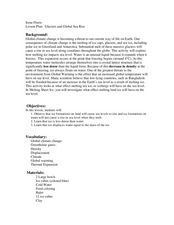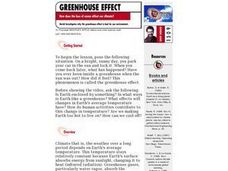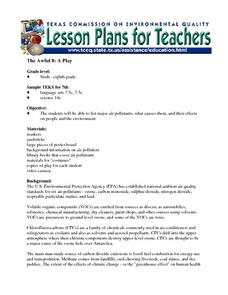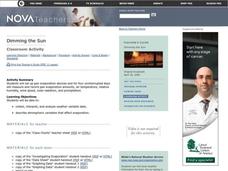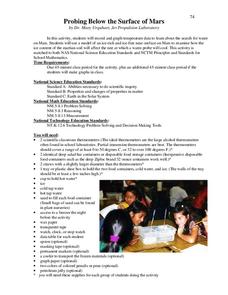Curated OER
The Day After Tomorrow: How is the Density of Water Related to Climate Change and Global Warming?
Science learners simulate what happens when ice breaks up and floats on water and how increased pressure on ice causes it to melt faster. They view a clip from the movie, The Day After Tomorrow, and relate their lab activities to what...
Curated OER
Help Save the Polar Bear
Students use ice cubes to demonstrate how the polar ice caps are melting and how it effects the polar bears. In this polar bear lesson plan, the teacher explains how polar bears live on the north pole and how they are having trouble due...
Space Awareness
The Big Meltdown
Explore the world (our world) of melting ice caps. Why are these caps melting? What is the effect of melting ice caps? Dive into the ever-present issue of global warming with a resource that has learners looking at data and participating...
Curated OER
Ice is N"ICE"!!
Students observe and describe, both orally and in writing. the different forms of water on the surface of the Earth and measure the approximate size of an iceberg. They also estimate and measure the amount of ice that floats above the...
Curated OER
Glaciers and Global Sea Rise
Students explain how melting glaciers affect global warming. In this earth science lesson, students investigate the change in ice density as it melts. They discuss the human and environmental impact of rising sea levels.
Curated OER
On the Rise . . . Sea Level and Global Warming
Ninth graders conduct an experiment to determine how melting sea ice affect sea level. In this earth science lesson, 9th graders explain the environmental consequences of rising sea level. They relate this lesson to global warming.
Curated OER
Global Warming Statistics
Students research real-time and historic temperature data of U.S. and world locations, and analyze the data using mean, median, and mode averages. They graph the data and draw conclusions by analyzing the data. A spreadsheet is used to...
Curated OER
How Does the Loss of Ozone Affect Our Climate
Students explore the greenhouse effect and what it does to the environment. They discuss if and how human behavior contributes to global warming and test natural materials for carbon content.
Curated OER
The Awful 8: The Play
Students perform a play based on pollution. In this pollution science lesson plan, students perform a play about different pollutants and how it effects our daily lives.
Curated OER
How Islands Form
Students how islands form, rising water levels, growth of coral, and volcanoes. They complete Island Investigation worksheets after researching island formation on various Internet websites.
Curated OER
The Awful 8: A Play
Middle schoolers perform a play that presents the causes and effects on people and the environment of the eight major air pollutants.
Curated OER
Greenhouse Effect
Pupils investigate the greenhouse effect. In this environmental lesson, students investigate why the greenhouse effect changes the climate through an experiment. Pupils use vinegar to simulate how acid damages the environment.
Curated OER
The Awful 8: The Play
Middle schoolers become aware of the cause and effects of different air pollutants. They present a play about the different pollutants.
Curated OER
Dimming the Sun
Students collect, interpret and analyze weather variable data. They describe atmospheric variables that affect evaporation. Students create graphs and analyze the information collected.
Curated OER
Probing Below the Surface of Mars
Students simulate the search for water in Mars using simple apparatus. In this space science lesson, students explain how soil temperature affects the cooling of probes. They graph the data collected from the simulation.






